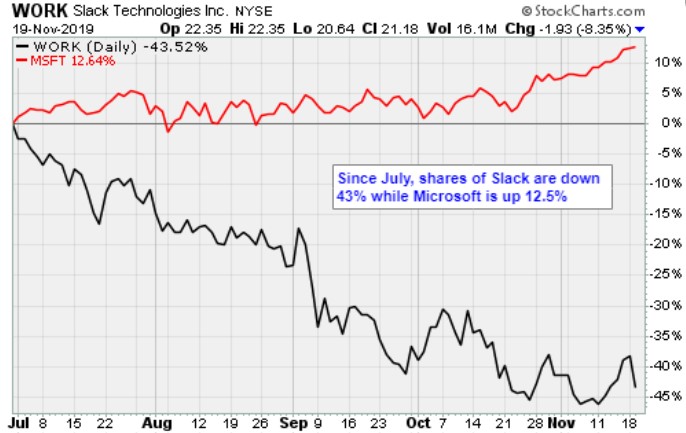Microsoft, Apple Platforms Prove Too Big for Underdog Competition
Enormous platforms are taking over most aspects of commerce. And there is almost nothing smaller players can do about it.
Microsoft (MSFT) announced Tuesday that Teams, its enterprise chat application, reached 20 million monthly active users, up 54% from July.
Smaller enterprise software firms should take note. That’s because their market share is next.
It’s tough to fault Microsoft managers for utilizing all its tools.
- Microsoft Office is the de facto productivity suite in the corporate world.
- Excel, Word and PowerPoint documents are ubiquitous.
- Teams is collaborative software that lets workers organize, start a chat, share files, participate in meetings and even make calls, all within the Office environment.
Adding Teams to the Office bundle is a no-brainer.
Two years ago, Teams was no more than an idea. At the time, Slack (WORK), an edgy San Francisco startup, was the clear market leader. Its cloud-based chat client was robust and well-liked for its ease of use.
As the company bulked up with venture capital, managers began pitching big enterprises about the benefits of chat vs. email, and the productivity gains from workers sharing and collaborating on files.
The concept has merit. McKinsey & Co., the global business management firm, noted in 2012 that the average worker spends 28% of the workweek managing email threads. There was a definite need for the product Slack was selling.
Analysts at IDC, an information technology researcher, predict the market for these software applications will swell to $3.5 billion by 2022.
Unfortunately for Slack, most of the files being shared are Office documents.
Microsoft has an inherent leverage because it owns the platform. And it was only a matter of time before the Redmond, Wash., software giant began to press its competitive advantage.
For perspective, Teams went from zero to 20 million users in only two years. That’s 8 million users above the latest numbers reported by Slack, according to CNBC.
It doesn’t matter that workers prefer to use Slack. Inertia keeps them within the larger Office platform.
At the consumer level, for example, Google Maps is widely considered to be the best-in-case logistics application. Engineers at the search giant have spent 15 years photographing city streets, integrating transit and local points of interest and building algorithms to make sense of traffic.
Google Maps works well. It dominates every platform except iOS, the operating system developed by Apple for its mobile devices.
Despite its widely reported shortcomings, Apple Maps is the most popular logistics app on iPhones and iPads by a wide margin. There is a good reason. It’s the default app, and many people will never go through the hassle of choosing another.
If a great product like Google Maps can’t overcome the inertia of incumbency on iPhones, the odds of smaller companies taking enterprise software markets from platform gatekeepers like Microsoft are nil.
Slack shares were down 9% in frantic trade Tuesday. The stock has been in a steady decline since its June debut at $36.25. Overall, shareholders have lost 30.5% since that time. Unfortunately, more pain is forthcoming for enterprise software stocks in general.
Most are stuck between the prospect of building out costly sales forces, even as platform gatekeepers like Amazon.com (AMZN), Microsoft, Alphabet (GOOGL) and Salesforce (CRM) enter the market with giveaway versions of their software.
It’s a margins nightmare. These larger platforms have extensive sales divisions. They can distribute software at very low marginal costs.
The best-case scenario is a buyout. Money-losing Pivotal Software (PVTL) got a lifeline in August when the digital transformation software company received a takeover offer from Dell Technologies (DELL). Others will may not fare as well.
Smaller firms like Dropbox (DBX), Box (BOX) and Cloudera (CLDR), to name a few, are fighting a war they cannot win. And it’s likely to get much worse.
Investors need to keep this in mind. While the share prices may lure investors into the belief that business can’t get worse, it surely can. Stay on your toes when you’re investing in small enterprises with big, big competition.
Best wishes,
Jon D. Markman




